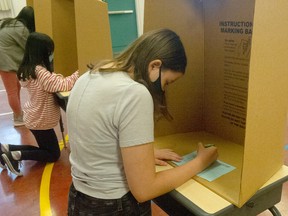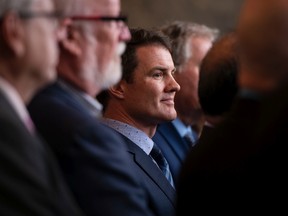Opinion: Voting laws disenfranchise a quarter of Canadian citizens. They're under 18 and there's growing support to lower the age to at least 16.

If there’s a toddler, preschooler or preteen wielding a pencil at the voting booth next to you at Vancouver’s advance polls for the civic election on Oct. 1 and Oct. 8, don’t be alarmed.
It’s not voter fraud being openly perpetrated. It’s legit, right down to the special ballots that the little ones under 12 will be filling out with several choice questions that seem a lot more fun than the ones facing the 18-and-older registered voters.
Sign up to know what's really happening by reading daily editorials and commentary by British Columbia's opinion leaders
Thanks for signing up!
A welcome email is on its way. If you don't see it, please check your junk folder.
The next issue of Vancouver Sun Informed Opinion will soon be in your inbox.
How do you like to spend your time in Vancouver? What would you like to learn more about in school? What quality is most important in a good leader? And, what is most important to you in Vancouver?
It will be interesting to see what value kids place on kindness, honesty, creativity and joy when it comes to leaders. Sure, it’s a kids’ questionnaire. But it is curious that experience and qualifications aren’t even listed.
As for what kids deem most important, the choices are: Parks, pools, community centres; Fire, rescue services and police; Libraries, theatres and local events; Civic gardens and green space. Not to prejudge the outcome that will be released Oct. 15, before the official polls close, but I’m betting that the fun stuff gets more votes than emergency services.
Coincident with real vote, students in Grades 4 to 12 can also vote if their school registers with the city.
It’s all aimed at engaging kids in the democratic process. But it is also part of a local, national and international movement to lower voting ages. Setting the age is arbitrary at best.
But deciding how low the age should be gets sticky.
Vancouver council unanimously endorsed 16 as the voting age for civic elections last year, falling in line with the Union of B.C. Municipalities, B.C. Teachers Federation, B.C. Government Employees Union and others.

This week, the House of Commons is expected to vote on Taylor Bachrach’s private member’s bill — the latest in a string of more than a dozen bills since 2015 to propose allowing anyone 16 and older to vote.
During his bill’s second reading in May, the NDP MP for Skeena-Bulkley Valley talked about peaceful protests by Heiltsuk youth in his riding that resulted in recognition of their fishing rights and about two Smithers youth who convinced the town to ban plastic bags.
“Young adults deserve to have a hand in the decisions on these issues,” Bachrach said.
If it passes, the bill would go to the Senate where Senator Marilou McPhedran’s almost identical bill is in second reading.
If either bill becomes law, it would eliminate the need for the court challenge filed last November by 13 youth in Ontario Superior Court — the equivalent of B.C.’s Supreme Court — that argues that the federal Elections Act is unconstitutional and denies the right to vote to nearly a quarter of Canadian citizens.
They are being represented by Justice for Children and Youth, Children First and the David Asper Centre for Constitutional Rights.
Section 3 the Canadian Charter of Rights and Freedoms guarantees the right of citizens to vote in federal and provincial/territorial elections and Section 15 states that regardless of age, everyone is equal before and under the law.
Further, they argue that the Universal Declaration of Human Rights says, “Everyone has the right to take part in the government of his country, directly or through freely chosen representatives.”
Canada is a signatory to it as well as the United Nations Convention on the Rights of the Child that requires countries to “assure to the child who is capable of forming his or her own views the right to express those views freely in all matters affecting the child” in accordance “with the age and maturity of the child.”
Cambridge law professor David Runciman argues that anyone six and older should be able to vote. Only babies, toddlers and others too young to read would remain disenfranchised.
“In all democratic societies, from ancient Athens to 1970s Britain, there were many more voters under 40 than over 60. That is no longer the case,” Runciman wrote recently in The Guardian. Now, that the middle-aged and elderly are the largest economic and political blocs, it’s their interests that predominate.
But that’s a temporal argument. The old aren’t likely to always be the majority.
Demanding children have equal rights to adults challenges the idea put forward by children’s rights activists since the Industrial Revolution that they deserve protection and in effect are entitled to special rights including the right not to be tried or sentenced as adults.
And, if we agree that the only impediment to children voting is capacity and freedom from coercion are the only impediments to children voting, should adults with dementia or bloc voters from religious or ethnic communities should also be disenfranchised?
Perhaps voting at 16 would engage kids earlier in the democratic process. But it’s not stopped youth from making a substantial difference. Nobel laureate Malala Yousafzai was 11 when she began advocating for the right to go to school. Environmental activist Greta Thunberg was 15 when she began her weekly protests.
Before we go too far down the road of equal rights for all, the remedies to youth’s disaffection with democracy might better be remedied with things like the city’s Kids Vote initiative. Or, perhaps better yet, politicians acting more like the kind of adult that children can admire and aspire to become.
dbramham@postmedia.com
-

Daphne Bramham: Money, politics, and the price of influence in Vancouver
-

Daphne Bramham: Vancouver mayor taps 'captains' of development industry to finance his campaign
Letters to the editor should be sent to sunletters@vancouversun.com. The editorial pages editor is Hardip Johal, who can be reached at hjohal@postmedia.com.
CLICK HERE to report a typo.
Is there more to this story? We’d like to hear from you about this or any other stories you think we should know about. Email vantips@postmedia.com.


